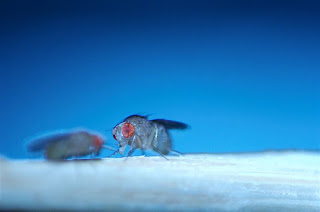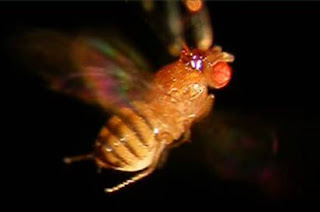The results of a diabolical experiment are forcing scientists and philosophers to reevaluate their notions of free will.
Bj/drn Brembs from the Free University in Berlin began his experiment by postulating that if fruit flies are no more than biological robots simply reacting to their environments (i.e. beings without free will), then they should move completely randomly in a featureless room. Then in stroke of pure, evil genius, Brembs and his team glued tiny hooks (attached to strings) to the heads of fruit flies and let them "loose" in completely white surroundings. The fruit flies could still move and beat their wings, but their senses were severely deprived of information and, obviously, they were tethered.
No, Stewart, I'm not arguing that rotting banana skin isn't completely delicious. I'm just asking what we're doing here? You know, like....what's the point?
Using complex computer analysis, Brembs found that the flies' movements were anything but random. George Sugihara, a mathematical biologist from the University of California at San Diego who was also involved in the study, said that there seems to be "a function in the fly brain which evolved to generate spontaneous variations in the behavior."
And would you look at that, honey? There's even a tiny hook glued to his adorable little head. Now if that isn't as cute as a little baby's button nose, I don't know what is!
Neuroscientist Gonzalo de Polavieja at the Independent University of Madrid said that the results of the experiment reveal in the flies "a complex decision-making processing underlying behavior. This seems a necessary condition for free will."
Brembs' findings resonate particularly with computer and robotics makers who may be able to use this information to make more complex, 'smarter' mechanisms.
 Slashdot
Slashdot  del.icio.us
del.icio.us  reddit
reddit  newsvine
newsvine  Y! MyWeb
Y! MyWeb